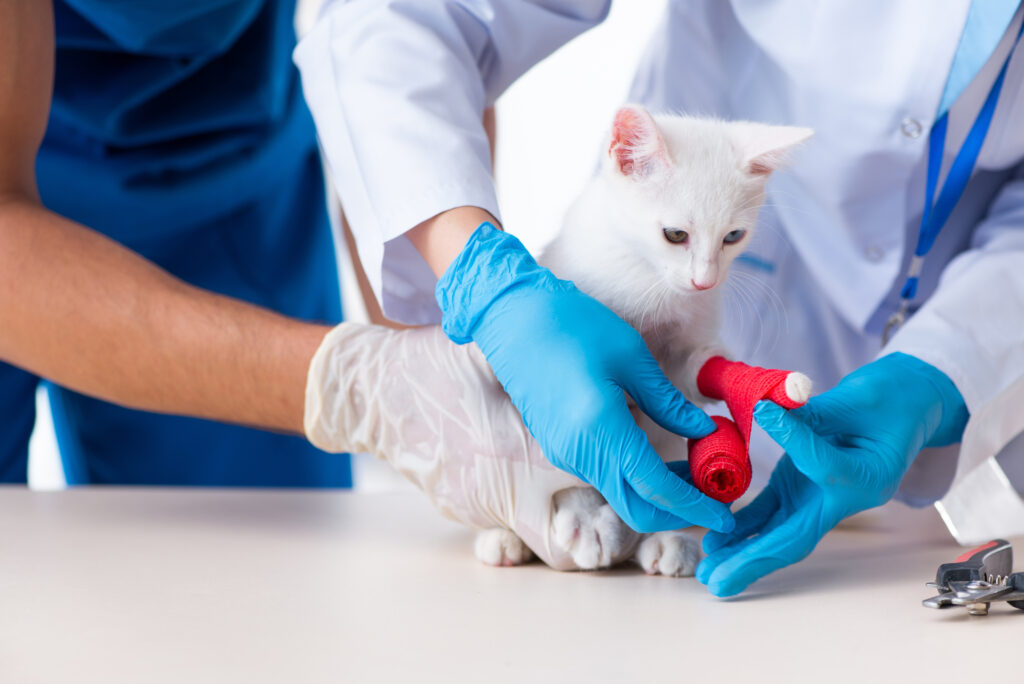5 Signs of Hip Problems in Your Pet
Hip problems are common in cats and dogs, and we at Trail Pet Hospital are here to help. We are pleased to offer a range of hip treatments, including femoral head ostectomy or FHO surgery. Our goal is to restore mobility and provide your furry companion with the needed relief. You can count on Dr. Suh and our dedicated team for exceptional care and service.

How Can You Tell If Your Pet Has a Hip Problem?
Warning signs of hip pain or problems in cats and dogs may include the following:
- Visible Signs of Pain: Your pet may show signs of pain if the hip joint is touched or manipulated. These may include vocalization, flinching, sensitivity, or licking the painful area.
- Limping or Favoring a Leg: A common sign of hip problems is avoiding putting weight on one or both hind legs. That can result in a limp or favoring the unaffected leg.
- Changed Gait: Your pet may show an abnormal or “bunny hopping” gait, where the legs move together instead of separately. You may also notice a wobbly or swaying gait.
- Reduced Activity: Your cat or dog may find it harder to get up due to pain or stiffness in the hip area. Your furry companion may struggle to jump, climb stairs, or enjoy physical activity.
- Muscle Mass Loss: Over time, reduced use and lack of mobility can take their toll on your pet’s muscles. That can result in muscles in the back legs appearing smaller or less developed.
What Are the Causes of Hip Problems in Cats and Dogs?
Hip problems can occur due to injury, degenerative joint disease, or other factors. Here’s a look at the most common causes of hip problems in cats and dogs:
- Genetics: Some cat and dog breeds are predisposed to hip dysplasia, a genetic condition where the bones in the ball and socket joint don’t grow at the same rate. That can lead to the instability and degeneration of the hip joint.
- Severe Arthritis: As the years go by, wear and tear on the hip joint can result in osteoarthritis, which can break down the cartilage in the hip joint. That can lead to bone-on-bone grating, leaving your furry friend with pain, stiffness, and inflammation.
- Aging: The natural aging process often causes degenerative changes in the hip joint. That’s why older pets are often more susceptible to hip problems.
- Trauma: Injury or accidents can lead to hip joint fracture or dislocation. That can impact your pet’s mobility and quality of life.
- Obesity: Obesity is one of the leading causes of hip problems. It poses an added stress on the hip joints, increasing the risk of hip pain and affecting mobility.
- Developmental Disorders: Conditions like Legg-Calvé-Perthes disease can affect the blood supply to your pet’s hip joint, leading to bone degeneration. Over time, the bone can crack or weaken, leading to joint collapse.
- Poor Nutrition: Inadequate nutrition during the early growth stages of a pet’s life can lead to improper bone and joint development. That can increase the risk of hip problems down the road.
Treating Hip Joint Problems
The first steps in treating hip joint problems are weight loss, medications, joint supplements, physical therapy, and other non-surgical treatments. Smaller dogs and cats, especially those with a healthy weight, may benefit from a procedure known as femoral head ostectomy. Large breed dogs with hip damage usually require a total hip replacement.
What Is Femoral Head Ostectomy?
Femoral head ostectomy is a surgical procedure that involves removing the head and neck of the femur, or thighbone. Without the femoral head rubbing against the damaged joint surfaces, many pets find pain relief. After an FHO surgery, the muscles and soft tissues adapt to support the limb over time. Most cats and dogs enjoy improved hip function and regain a significant degree of mobility, leading to a relatively normal and pain-free life.
Femoral Head Ostectomy Near Me in Dallas, TX
If your cat or dog shows signs of hip problems, contact Trail Pet Hospital to schedule a consultation. Our experienced veterinary team will recommend the most conservative treatment options to relieve pain and restore your furry friend’s mobility. You can always count on us for state-of-the-art, gentle care. We invite you to call us at 972-629-9766 to schedule your furry friend’s appointment or request one online today!
